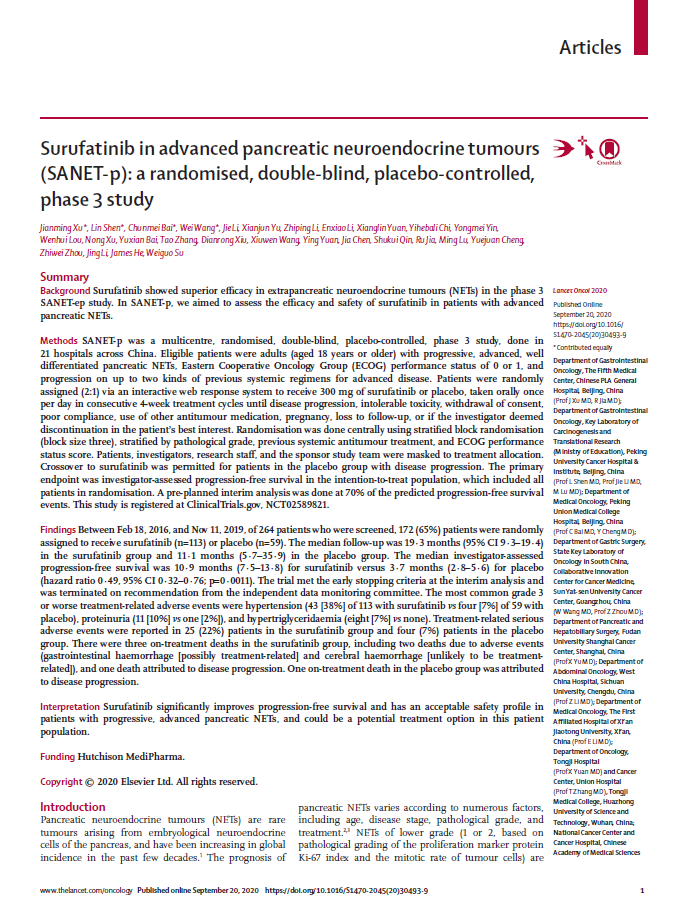《刺針·腫瘤學》:索凡替尼SANET-p III期研究
Surufatinib in advanced pancreatic neuroendocrine tumours (SANET-p): a randomised, double-blind, placebo-controlled, phase 3 study
Jianming Xu*, Lin Shen*, Chunmei Bai*, Wei Wang*, Jie Li, Xianjun Yu, Zhiping Li, Enxiao Li, Xianglin Yuan, Yihebali Chi, Yongmei Yin, Wenhui Lou, Nong Xu, Yuxian Bai, Tao Zhang, Dianrong Xiu, Xiuwen Wang, Ying Yuan, Jia Chen, Shukui Qin, Ru Jia, Ming Lu, Yuejuan Cheng, Zhiwei Zhou, Jing Li, James He, Weiguo Su
Summary
Background
Surufatinib showed superior efficacy in extrapancreatic neuroendocrine tumours (NETs) in the phase 3 SANET-ep study. In SANET-p, we aimed to assess the efficacy and safety of surufatinib in patients with advanced pancreatic NETs.
Methods
SANET-p was a multicentre, randomised, double-blind, placebo-controlled, phase 3 study, done in 21 hospitals across China. Eligible patients were adults (aged 18 years or older) with progressive, advanced, well differentiated pancreatic NETs, Eastern Cooperative Oncology Group (ECOG) performance status of 0 or 1, and progression on up to two kinds of previous systemic regimens for advanced disease. Patients were randomly assigned (2:1) via an interactive web response system to receive 300 mg of surufatinib or placebo, taken orally once per day in consecutive 4-week treatment cycles until disease progression, intolerable toxicity, withdrawal of consent, poor compliance, use of other antitumour medication, pregnancy, loss to follow-up, or if the investigator deemed discontinuation in the patient’s best interest. Randomisation was done centrally using stratified block randomisation (block size three), stratified by pathological grade, previous systemic antitumour treatment, and ECOG performance status score. Patients, investigators, research staff, and the sponsor study team were masked to treatment allocation. Crossover to surufatinib was permitted for patients in the placebo group with disease progression. The primary endpoint was investigator-assessed progression-free survival in the intention-to-treat population, which included all patients in randomisation. A pre-planned interim analysis was done at 70% of the predicted progression-free survival events. This study is registered at ClinicalTrials.gov, NCT02589821.
Findings
Between Feb 18, 2016, and Nov 11, 2019, of 264 patients who were screened, 172 (65%) patients were randomly assigned to receive surufatinib (n=113) or placebo (n=59). The median follow-up was 19·3 months (95% CI 9·3–19·4) in the surufatinib group and 11·1 months (5·7–35·9) in the placebo group. The median investigator-assessed progression-free survival was 10·9 months (7·5–13·8) for surufatinib versus 3·7 months (2·8–5·6) for placebo (hazard ratio 0·49, 95% CI 0·32–0·76; p=0·0011). The trial met the early stopping criteria at the interim analysis and was terminated on recommendation from the independent data monitoring committee. The most common grade 3 or worse treatment-related adverse events were hypertension (43 [38%] of 113 with surufatinib vs four [7%] of 59 with placebo), proteinuria (11 [10%] vs one [2%]), and hypertriglyceridaemia (eight [7%] vs none). Treatment-related serious adverse events were reported in 25 (22%) patients in the surufatinib group and four (7%) patients in the placebo group. There were three on-treatment deaths in the surufatinib group, including two deaths due to adverse events (gastrointestinal haemorrhage [possibly treatment-related] and cerebral haemorrhage [unlikely to be treatment-related]), and one death attributed to disease progression. One on-treatment death in the placebo group was attributed to disease progression.
Interpretation
Surufatinib significantly improves progression-free survival and has an acceptable safety profile in patients with progressive, advanced pancreatic NETs, and could be a potential treatment option in this patient population.
Funding: Hutchison MediPharma.
Trial Registration: ClinicalTrials.gov Identifier: NCT02589821.
Citations and Links
Please follow the link below to access the publication:
Lancet Oncol. 2020; S1470-2045(20)30493-9. [published online ahead of print, 2020 Sep 20]
